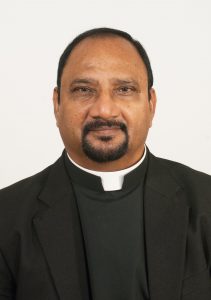 Dear Members and Readers,
Dear Members and Readers,
The message of Christmas is to share joy with one another and very specially with those who are wounded and suffering due to natural disasters, war, violence, sexual abuse, poverty, exploitation and discrimination of various kinds. The Birth of Jesus brings hope to all those who are depressed and oppressed, love to all who are lonely and abandoned and peace to all who have lost hope. It is possible to hope for a new world where there will be no more division and discrimination based on caste, culture, gender or religion, where all will be united in love cherishing one another’s differences with joy. It is God’s wish that “All may be one.” It is unity within difference and not a unity of uniformity or universalism.
The articles in this Bulletin connect us by on Sharing and Proclaiming our joy with profound hope. And that is exactly what Christmas is all about.
The first article by James H. Kroeger, MM, deals with Evangelii Gaudium where Pope Francis invites the Church to read the ever-changing signs of the times. He is clearly aware that “today’s vast and rapid cultural changes demand that we constantly seek ways of expressing unchanging truths in a language which brings out their abiding newness” (n. 41). According to the author, the success of the mission and evangelization requires “renewed evangelizers and joy which is the most infallible sign of the presence of God.” Joy is convincing; joy evangelizes. Pope Francis invites all, “to embark upon a new chapter of evangelization marked by this joy”. Being transformed by the joy of salvation, the author invites everyone to become a joyful herald of missionary evangelization!
In the second article, “Intercultural Context and Mission”, Peter Baekelmans, CICM explains that there is a difference between “multi-national living” and “inter-national living”! It is not because different nationalities live together under one roof that we are automatically in dialogue on a cultural level. Pope Francis complains that most of the colleges in Rome are more like hotels than real religious communities. Interculturality involves “interaction” among the different cultures in a community. Building international communities has become a way of doing mission. But it is only when we show how to live together as one family in an intercultural way that we can set a good example. He further reminds us that Christian culture goes beyond all nationalities. For us intercultural living is to give priority to the poor, not to try to be the first seated, not to seek to be rich and famous but to share what we have and to listen to God and obey our superiors. He also talks about the need to “exit learning” and “enter learning” in the intercultural mission context. It is not enough to learn about the culture of the mission country, we also have to leave our own culture behind. Fr. Peter emphasises that in the interreligious context, dialogue is necessary but this dialogue must be one of consideration and religious behaviour.
Joseph Scaria Palakeel, MST, in his article, “Identities and Universalisms in the Missionary Context of India”, talks about Indian Christians who are ethnically, culturally, linguistically, and ritually diverse, are proud to be Christian. In the multi-religious context of India, there is reciprocal respect for the other person’s religion and culture. But there is an attempt to spread a new concept of universalism that is affecting India. Adherents of this universalism are trying to suppress other minority groups in India. They dream of turning India into a ‘Hindu Rashtra’ (nationalism) with the ideal of ‘one nation, one culture, one religion’, where every citizen adopts the Hindu way of life under a new Constitution. This universalism is a threat. Pope Francis cautions that “an authoritarian and abstract universalism” which seeks to eliminate all differences and tradition in “a superficial quest for unity” and a “one-dimensional uniformity” is false. “This false universalism ends up depriving the world of its various colours, its beauty and, ultimately, its humanity…. The human family needs to learn to live together in harmony and peace, without all of us having to be the same.” True universalism is actually oneness, unity in diversity.
In the last article, “Mission in the African Church: In the Light of Sexual Abuse and the COVID-19 Pandemic”, Stanislaus T. Lazar, SVD, speaks about the context of sexual abuse and the struggle of society. He says that during the pandemic, there have been more cases of sexual abuse and the harassment of women. Racial abuse and maltreatment of children were higher. He reminds us of our prophetic mission.
He says that the abuse committed by the Church hierarchy or any person should not deter us from following our Master and to observe our vows prophetically. Our mission is to heal the suffering, seek justice, prevent future abuse and restore trust and credibility within the ecclesial community. Our mission is to be vigilant, compassionate and prophetic. Our mission is to bring hope and joy to those who suffered and are still suffering.
I am sure these articles will serve to enlighten your mission both individually and collectively. We have included Chris Chaplin, MSC’s, Christmas Message that he prepared for the SEDOS Christmas gathering at the Collegio dei Verbiti, the Annual Report of SEDOS and the parting words of our former President, Tesfaye Tadesse, MCCJ.
I take this opportunity to wish all the Members of SEDOS a joyful and grace-filled Christmas and a prosperous New Year 2023.
John Paul Herman, SVD
Director of SEDOS



